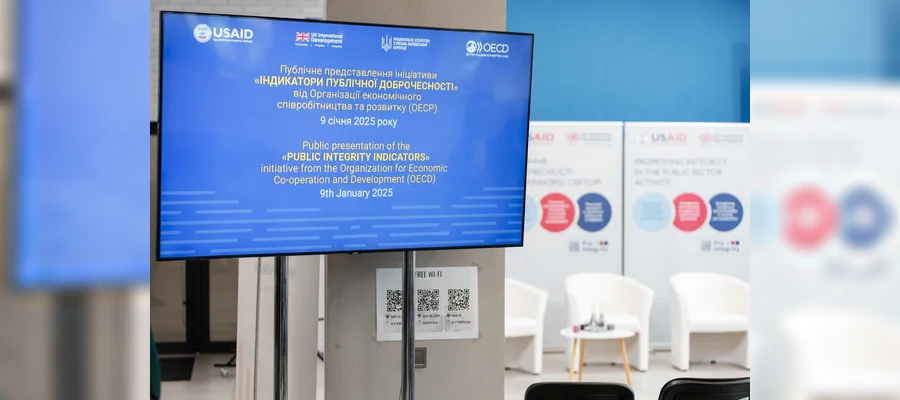During 2024, Ukraine was assessed by three Public Integrity Indicators of Ukraine from the Organisation for Economic Co-operation and Development (OECD): the quality of the strategic framework - an indicator that assesses the comprehensiveness and effectiveness of Ukraine's anti-corruption strategies; accountability of public policy - an indicator that assesses the level of transparency and accountability of policy-making processes; effectiveness of internal control and risk management - an indicator that assesses the strength of the internal control system, audit and management practices. This was stated by Viktor Pavlushchyk, Head of the National Agency on Corruption Prevention (NACP), during the presentation of the results of data collection for the OECD Public Integrity Indicators of Ukraine on 9 January 2025.
He also noted that these criteria helped to see the strengths and weaknesses of our country and bring us closer to modern standards of government resilience to corruption risks and strengthening of public integrity principles.
During the event, experts from the OECD Directorate for Public Administration, the NAPC, the Department for Harmonisation of State Internal Financial Control of the Ministry of Finance and other ministries spoke about the importance of the Public Integrity Indicators Initiative and presented the results of data collection on the quality of state strategies in the field of integrity and anti-corruption, accountability of public policy-making and the effectiveness of internal control and risk management.
The event was also attended by representatives of the Government Office for Coordination of European and Euro-Atlantic Integration and international partners.
Oksana Hus, Policy Analyst and OECD Country Coordinator for Ukraine at the OECD Directorate, spoke about the quality of the strategic framework for the results of the Public Integrity Indicators of Ukraine. According to her, the assessment of Ukraine's strategy demonstrates average results by OECD standards in general, but in six aspects the results are above average. Ukraine covers most of the areas in the corruption risk assessment, as well as 100% of the indicators, which is in line with OECD practice, and covers indicators that allow assessing the effectiveness of measures.
‘The monitoring system of anti-corruption programmes, digitalisation and public consultations are the strengths of the Strategy. However, we have identified gaps in aspects such as public management, financial control and risk management. These areas require additional attention to achieve better results,’ the speaker said.
She stressed that there are still some problems with the practical implementation of decisions, which requires closer cooperation with other government agencies and stakeholders.
The OECD Directorate's policy analysts and NACP representatives presented the results of Ukraine's public integrity indicators in public policy making, internal control and risk management, as well as further actions and challenges.
In particular, the assessment of the third indicator was summarised by Maryna Barynina, Head of the NACP's Internal Audit Sector: ‘I would like to highlight four areas out of eleven in which Ukraine has achieved the greatest success - the activities of the Central Harmonisation Unit of the Ministry of Finance, the regulatory framework for risk management, and maximum coverage of public sector bodies by internal audit. At the same time, Ukraine has ensured a very high level of acceptance of audit recommendations by public sector managers, which indicates a high level of maturity of both internal audit and public sector managers themselves.’
Karisa Mundo, Team Leader of the OECD's Public Integrity Indicators Unit, congratulated Ukraine on its success in improving its anti-corruption system and thanked the participants of the event: ‘Ukraine not only demonstrates positive results, but is a pioneer in some areas. Special thanks to the NACP for their efforts in collecting, validating and providing data, as well as for their support during the integrity review. We thank all stakeholders for their cooperation and joint contribution to this important project!’
For reference
The Public Integrity Indicators are the first set of internationally agreed data designed to promote best practice in building integrity systems by comparing country performance and sharing best practices.
The Public Integrity Indicators (PII) initiative was created by the OECD Working Group on Integrity and Anti-Corruption to enable member countries to move from indicators based on subjective assessments to objective data. These new tools allow countries to benchmark their performance against OECD and international averages, and to better understand which aspects of their integrity systems are working well and which need to be improved.
The OECD's IPI sets out modern standards for assessing the resilience of governments to corruption risks and strengthening public integrity. Based on primary data sources, the IPIs contribute to the global fight against corruption by offering practical and reliable information.
This is critically important for Ukraine on its path to European Union membership, as well as for the alignment of national legislation with EU standards.
The results of the data collection for the OECD Public Integrity Indicators for Ukraine are available here.
As a reminder, Ukraine is one of the first non-OECD countries, neither an OECD member nor an associated country, to join the Public Integrity Indicators initiative and provide data on three data blocks.
The event was supported by the Pro-Integrity project: Promoting Integrity in the Public Sector, funded jointly by USAID - US Agency for International Development and UK International Development.










